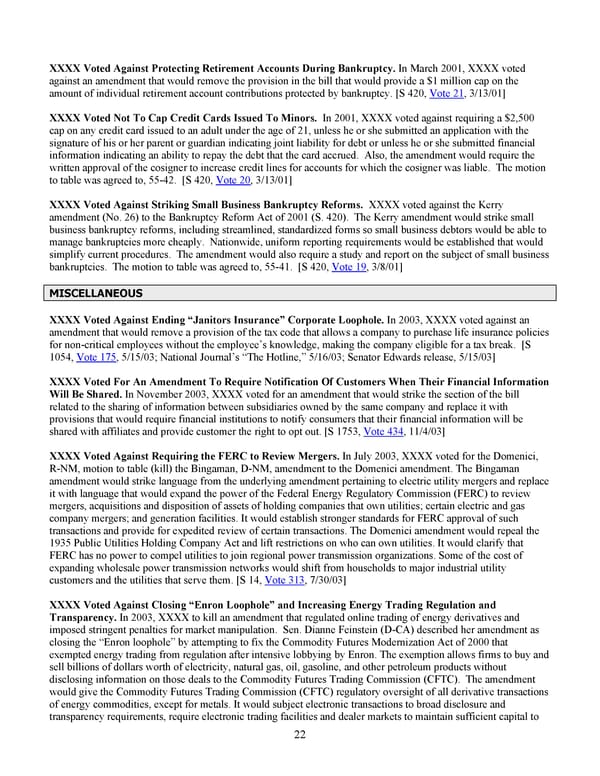XXXX Voted Against Protecting Retirement Accounts During Bankruptcy. In March 2001, XXXX voted against an amendment that would remove the provision in the bill that would provide a $1 million cap on the amount of individual retirement account contributions protected by bankruptcy. [S 420, Vote 21, 3/13/01] XXXX Voted Not To Cap Credit Cards Issued To Minors. In 2001, XXXX voted against requiring a $2,500 cap on any credit card issued to an adult under the age of 21, unless he or she submitted an application with the signature of his or her parent or guardian indicating joint liability for debt or unless he or she submitted financial information indicating an ability to repay the debt that the card accrued. Also, the amendment would require the written approval of the cosigner to increase credit lines for accounts for which the cosigner was liable. The motion to table was agreed to, 55-42. [S 420, Vote 20, 3/13/01] XXXX Voted Against Striking Small Business Bankruptcy Reforms. XXXX voted against the Kerry amendment (No. 26) to the Bankruptcy Reform Act of 2001 (S. 420). The Kerry amendment would strike small business bankruptcy reforms, including streamlined, standardized forms so small business debtors would be able to manage bankruptcies more cheaply. Nationwide, uniform reporting requirements would be established that would simplify current procedures. The amendment would also require a study and report on the subject of small business bankruptcies. The motion to table was agreed to, 55-41. [S 420, Vote 19, 3/8/01] MISCELLANEOUS XXXX Voted Against Ending “Janitors Insurance” Corporate Loophole. In 2003, XXXX voted against an amendment that would remove a provision of the tax code that allows a company to purchase life insurance policies for non-critical employees without the employee’s knowledge, making the company eligible for a tax break. [S 1054, Vote 175, 5/15/03; National Journal’s “The Hotline,” 5/16/03; Senator Edwards release, 5/15/03] XXXX Voted For An Amendment To Require Notification Of Customers When Their Financial Information Will Be Shared. In November 2003, XXXX voted for an amendment that would strike the section of the bill related to the sharing of information between subsidiaries owned by the same company and replace it with provisions that would require financial institutions to notify consumers that their financial information will be shared with affiliates and provide customer the right to opt out. [S 1753, Vote 434, 11/4/03] XXXX Voted Against Requiring the FERC to Review Mergers. In July 2003, XXXX voted for the Domenici, R-NM, motion to table (kill) the Bingaman, D-NM, amendment to the Domenici amendment. The Bingaman amendment would strike language from the underlying amendment pertaining to electric utility mergers and replace it with language that would expand the power of the Federal Energy Regulatory Commission (FERC) to review mergers, acquisitions and disposition of assets of holding companies that own utilities; certain electric and gas company mergers; and generation facilities. It would establish stronger standards for FERC approval of such transactions and provide for expedited review of certain transactions. The Domenici amendment would repeal the 1935 Public Utilities Holding Company Act and lift restrictions on who can own utilities. It would clarify that FERC has no power to compel utilities to join regional power transmission organizations. Some of the cost of expanding wholesale power transmission networks would shift from households to major industrial utility customers and the utilities that serve them. [S 14, Vote 313, 7/30/03] XXXX Voted Against Closing “Enron Loophole” and Increasing Energy Trading Regulation and Transparency. In 2003, XXXX to kill an amendment that regulated online trading of energy derivatives and imposed stringent penalties for market manipulation. Sen. Dianne Feinstein (D-CA) described her amendment as closing the “Enron loophole” by attempting to fix the Commodity Futures Modernization Act of 2000 that exempted energy trading from regulation after intensive lobbying by Enron. The exemption allows firms to buy and sell billions of dollars worth of electricity, natural gas, oil, gasoline, and other petroleum products without disclosing information on those deals to the Commodity Futures Trading Commission (CFTC). The amendment would give the Commodity Futures Trading Commission (CFTC) regulatory oversight of all derivative transactions of energy commodities, except for metals. It would subject electronic transactions to broad disclosure and transparency requirements, require electronic trading facilities and dealer markets to maintain sufficient capital to 22
 HRC vote skeleton Page 25 Page 27
HRC vote skeleton Page 25 Page 27